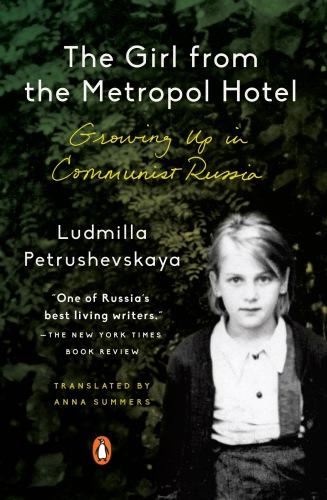
The Girl from the Metropol Hotel
Growing Up in Communist Russia
کتاب های مرتبط
- اطلاعات
- نقد و بررسی
- دیدگاه کاربران
نقد و بررسی

December 5, 2016
In this memoir, acclaimed novelist Petrushevskaya (There Once Lived a Woman Who Tried to Kill Her Neighbor’s Baby) recounts her impoverished Moscow childhood with a blend of dark humor and clipped, piercing realism. She was born in 1938 to a family of Bolshevik intellectuals who lived in Moscow’s preeminent Metropol Hotel. Petrushevskaya, along with her mother, aunt, and grandmother, soon had to flee the city for Kuibyshev in 1941, when the family was deemed “enemies of the people.” Leaving Moscow on a cattle car at the start of the war was downright luxurious compared to the near-starvation that Petrushevskaya and her family suffered for years to come, with Petrushevskaya taking to begging on the street, often pretending to be an orphan or disabled. But despite the hardships she endured, her impish spirit flourished and she ran around the streets, shoeless but never beaten down. After returning to Moscow at age nine, a wild child, she was sent to a series of summer camps in an effort to civilize her (they were not entirely successful); despite mediocre grades in college, she still managed to squeak by with a degree in journalism. The definition of incorrigible and indomitable, both on the page and in her life, Petrushevskaya shows that even in the harshest of circumstances, spirited determination can prevail.

November 15, 2016
Autobiography of an acclaimed Russian writer who grew up "hungrier, dirtier, and colder than everyone else."In a lively, irreverent memoir, journalist and fiction writer Petrushevskaya (There Once Lived a Mother Who Loved Her Children, Until They Moved Back In, 2014, etc.), known for her subversive fairy tales, recalls a nightmarish childhood. She was born in 1938 in Moscow's Metropol Hotel, the city's "most famed residential building." While she was still an infant, her family members, Bolshevik intellectuals, were deemed "enemies of the people." In 1941, she, her mother, grandmother, and aunt fled Moscow in a cattle car for Kuibyshev, where they were treated as "pariahs, untouchables." In gritty detail, the author depicts their precarious life during the war. Always starving, the author "ate glue in secret because of the rumor that it was flavored with real cherries." The family foraged in neighbors' garbage, and her aunt made soup from cabbage leaves picked up from the ground at the market. Dirty, "shaggy, covered with lice and bedbug bites," for a time she begged in the streets, once pretending to be crippled. After the war, she and her mother were able to return to the Metropol, but by then she was "an unmanageable, wild child" and therefore unwelcome at the hotel. She was sent to a summer camp, which nurtured her "hatred of constant supervision and collectivism of any kind, and at the same time admiration to the point of tears at the sight of a marching squad." Feisty and incorrigible, Petrushevskaya managed to get through high school, despite earning low grades, and she went on to study journalism in college. "We had to read endless tomes on the Communist press, primarily by Lenin," she writes. "We were being trained to become ideologically sound ignoramuses," but she was determined to get a diploma so that she could work as a professional journalist. With spunk and defiance, she survived, and transcended, the privations of her youth. A terse, spirited memoir that reads like a picaresque novel.
COPYRIGHT(2016) Kirkus Reviews, ALL RIGHTS RESERVED.

February 1, 2017
In times of extreme deprivation, the small symbols of normalcy we hold close to ourselves give us the strength to carry on. Petrushevskaya (There Once Lived a Mother Who Loved Her Children until They Moved Back In, 2014) drives home this point eloquently in her moving memoir. The daughter of Russian intelligentsia, she was forced to flee with her family from Moscow's elite Metropol Hotel to distant Kuibyshev in a cattle car as the storm clouds of WWII grew ever darker. Foraging in trash for cabbage leaves to make soup and skipping school because she had no shoes, Petrushevskaya still longed for a doll she could call her own, an object that could tether her to some sense of comfort amid all the starkness. Through such fragmented episodes, Petrushevskaya succeeds in showing just how off-the-bell-curve her extraordinary life has been. That she grew up to be a gifted writer, learning to read from newspapers left in the trash, is proof that the brightest, most fiery diamonds are forged under extreme pressure.(Reprinted with permission of Booklist, copyright 2017, American Library Association.)

























دیدگاه کاربران